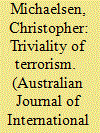| Srl | Item |
| 1 |
ID:
113310


|
|
|
|
|
| Publication |
2012.
|
| Summary/Abstract |
In November 2002, a man with 'atypical pneumonia' treated in Foshan hospital, Guangdong Province, in the People's Republic of China, was the first known case of Severe Acute Respiratory Syndrome (SARS). However, it was not until April 2003 that the Chinese government admitted to the full scale of 'atypical pneumonia' cases infected with SARS, two months after the disease had rapidly spread across the world with initial infections in Hong Kong and Vietnam sourced to Guangdong. In 2008, Zimbabwe experienced one of the biggest outbreaks of cholera ever recorded. By February 2009, the disease had spread across all of Zimbabwe's 10 provinces and to neighbouring countries-Botswana, South Africa, Zambia and Mozambique-causing thousands of infections amongst their populations. This article seeks to examine what duties the Chinese and Zimbabwe states had to protect their citizens and the international community from these outbreaks. The article refers to the findings of the International Law Commission's study into the role of states and international organisations in protecting persons in the event of a disaster to consider whether there is an international duty to protect persons from epidemics. The article concludes that both cases reveal a growing concept of protection that entails an international duty to assist individuals when an affected state proves unwilling or unable to assist its own population in the event of a disease outbreak.
|
|
|
|
|
|
|
|
|
|
|
|
|
|
|
|
| 2 |
ID:
113313


|
|
|
|
|
| Publication |
2012.
|
| Summary/Abstract |
The role of non-governmental organisations (NGOs) in global governance has attracted increasing attention over the past two decades. Yet the scholarly concern with the potential for NGOs to democratise international organisations has worked to neglect inquiry into the nature of their activities and the strategies that they deploy as policy-making participants in global governing arrangements. This article provides an account of the roles that NGOs play in international trade governance at the World Trade Organization (WTO) via their international campaign activities. Utilising examples of two NGO campaigns directed at the WTO (in the areas of intellectual property and multilateral investment rules), it demonstrates that NGOs play entrepreneurial roles in broadening the trade agenda by publicising neglected trade-related issues, building coalitions and boosting the negotiating resources of developing member countries. By examining their attempts to articulate an expanded conception of the global public interest, the article concludes that NGOs should be viewed as important actors within global public policy networks, even when they are formally excluded from the decision-making tables of international organisations.
|
|
|
|
|
|
|
|
|
|
|
|
|
|
|
|
| 3 |
ID:
113312


|
|
|
|
|
| Publication |
2012.
|
| Summary/Abstract |
This article assesses former Russian President Dmitry Medvedev's proposal for a new security system and varying perspectives in the context of this development. US-led unipolarity has been undermined as a gradually more independent 'Europe' has weakened transatlantic unity and that of a broader 'West'. Russia could neither join the North Atlantic Treaty Organization or the European Union (EU), nor assume directorship for security in the former Soviet Union. It has nonetheless increased its ties and influence with the EU, becoming a major trade partner and the biggest supplier of energy resources. A discourse of multipolarity accompanies Russian geopolitical ambitions and incorporates demands for new arrangements that can facilitate reliable cooperation in the security field and beyond. This implies recognising and accommodating Russian interests, which presents challenges to existing organisations. Medvedev's proposal is viewed differently by political-security sectors in the United States, Germany, France, Poland, Russia and the hybrid EU.
|
|
|
|
|
|
|
|
|
|
|
|
|
|
|
|
| 4 |
ID:
113311


|
|
|
|
|
| Publication |
2012.
|
| Summary/Abstract |
This article finds that the Australian government's perception of the threat of terrorism continues to be fundamentally flawed. Suggesting that it is imperative to clearly identify the sources and targets of the terrorist threat, the article concludes that terrorism does not pose an existential or even major objective threat to Western liberal democracies like Australia. At the same time, the political and psychological sensibilities surrounding terrorism, in combination with public demands for action, may require democratic governments to respond. Any response, however, needs to be carefully calibrated to meet the requirements of proportionality and (potential) effectiveness.
|
|
|
|
|
|
|
|
|
|
|
|
|
|
|
|